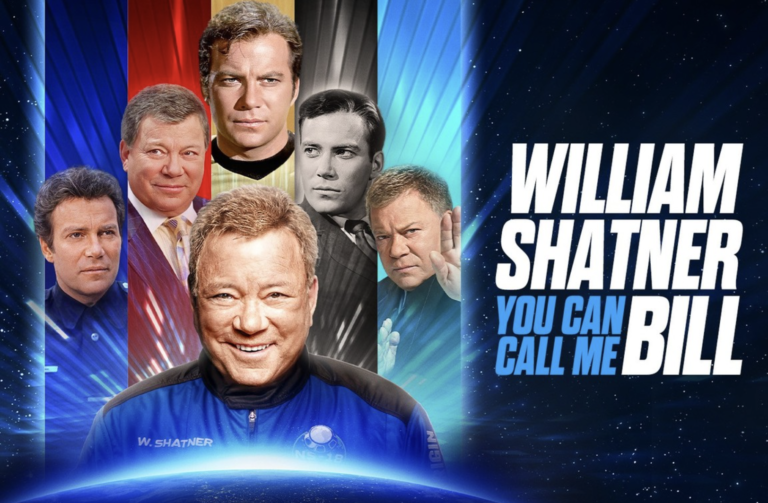
©Courtesy of Legion M
William Shatner : You Can Call Me Bill : From make-believe starship captain to a real-life rocketman, William Shatner has led one of the most unique and best-lived lives on the planet. And while the actor William Shatner may be recognizable around the globe, the man behind the masks is even more interesting than the iconic roles he’s played. Join Legion M and the acclaimed documentary team at Exhibit A Pictures (Leap of Faith: William Friedkin on The Exorcist, Memory: The Origins of Alien, 78/52: Hitchcock’s Shower Scene) in producing this fascinating look at one of the most illustrious actors of our time.
Director : Alexandre O. Philippe
Executive Producer : David Baxter, Terri Lubaroff, Paul Scanlan
Screenwriter : Alexandre O. Philippe
Distributor : Legion M
Production Co : Exhibit A Pictures, CCG Guardian Entertainment, Legion M
Rating : PG-13 (A Suggestive Reference|Some Language|Brief Drug Use)
Genre : Documentary, Biography
Original Language : English
Release Date : Mar 22, 2024, Limited.
Q&A with Actor Willam Shatner, moderated by Neil deGrasse Tyson
Neil deGrasse Tyson: Please help me wish him a very very happy 93rd birthday this week and welcome to the stage Mr. William Shatner.
William Shatner: Thank you so much. Just before he went on stage, Neil deGrasse Tyson handed me the little Ricola, so you’ve got to know somebody who does public speaking a lot. They carry around these candies to make sure their voice is okay…
Neil deGrasse Tyson: You were getting all choked up on the side there so I just wanted to make sure…
William Shatner: When your credits came on…
Neil deGrasse Tyson: I just want to say that we’ve corresponded over the years. I’ve been on your show, you’ve been on my show, and at no time did you say to me “You can call me Bill.” So you’re still Mr. Shatner to me until that moment occurs.
William Shatner: Call me Mr. Shatner. [Laughter] Neil, I’ll call you Neil, you should call me Bill.
Neil deGrasse Tyson: Thank you. Bill, you’ve left nothing to the imagination. There was no missing bits of what matters to Bill Shatner here. So I don’t even know how to begin to talk about this that hasn’t already unfolded in the last 90 minutes. I’ll try to credit all that has been assembled and put together in that exercise.
William Shatner: It’s like being naked.
Neil deGrasse Tyson: But you were naked in the pool when you saw the lizard. It’s not like you ain’t been naked before…
William Shatner: Yeah, but I’m in a peculiar position. This film is about me so now you’re going to ask me about that wonderful moment that I’m in. I have to say, “Oh yes, I was in that wonderful moment wasn’t I?” It’s all about me. How do you talk about a biography and not say if it’s not a compliment…
Neil deGrasse Tyson: I can ask about other things.
William Shatner: Like what’s the weather going to be like…
Neil deGrasse Tyson: I can do better than that. You commented on the launch of the rocket that you felt the G-force. I checked on Blue Origin’s website and it says 2Gs, which is a little less than an amusement park ride [audience laughs]
William Shatner: You mean, there’s an amusement park ride that’s more than 2 Gs?
Neil deGrasse Tyson: They take you up to near between 2 and 3 Gs.
William Shatner: I’m telling you, this was more than 2 Gs. The person who said it’s a little less than 2 Gs, they don’t know what they’re talking about ‘cause they weren’t there.
Neil deGrasse Tyson: [loud chuckle] Okay, okay.
William Shatner: It was like an elephant sitting on my chest, but worse than that is that you don’t know if the elephant’s going to get off. You’re thinking, “Oh my God, I could die.” Then suddenly [beat] the elephant’s gone, but you don’t know what’s going to happen. Why does that puzzle you?
Neil deGrasse Tyson: [laughing big] Alright, it was going to come back so you did know it wasn’t going to keep sitting [on you].
William Shatner: I didn’t, no. You know there was hydrogen in the ship. You remember the Hindenburg?
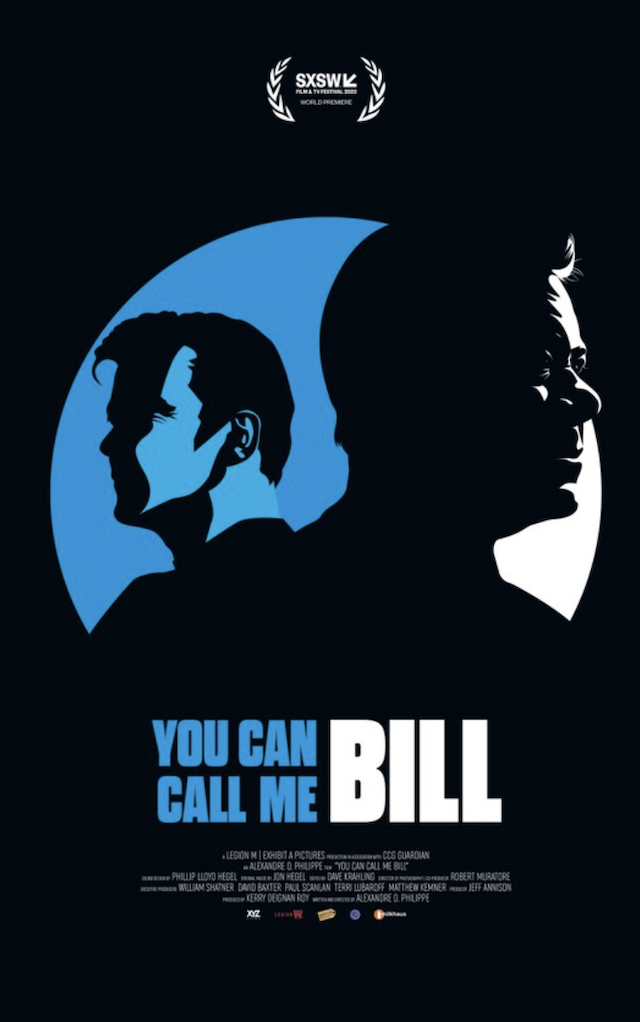
©Courtesy of Legion M
Neil deGrasse Tyson: Yeah, hydrogen and oxygen are highly explosive together.
William Shatner: Hydrogen burns by itself, I’m here to tell you.
Neil deGrasse Tyson: Oxygen helps that. I’m saying, “Yes you were like sitting on top of a bomb!”
William Shatner: That’s exactly my point; so whether it was 2Gs or 7Gs, it was a bomb.
Neil deGrasse Tyson: I was looking at the gantry and they’re just steps up to the capsule.
William Shatner: They took me there early up to 11 flights. [Tyson responds with a big laugh]. I was there a day early and thought, “Why am I here?” and they said, “Oh, let’s go see the spaceship.” We drove out there to the spaceship and then I’m looking up there, and they said, “Let’s go up there. It’s 11 flights, the desert is at 4,000, almost 5,000 miles like Denver…
Neil deGrasse Tyson: So you already don’t have as much oxygen…
William Shatner: Already, I’m [gasping] just getting out of the car; then they say, “Let’s go up the gantry…”
Neil deGrasse Tyson: Wait, isn’t this Jeff Bezos’s operation? The least he could have done was sprung for an elevator.
William Shatner: Exactly my point.
Neil deGrasse Tyson: If you put a 90 year old man up…
William Shatner: 92. Then I had to walk up 11 flights at 4,000 ft. Okay, and I’m wondering, “Why [have] they got me here?” Then I suddenly realize, of course they’re checking out the old guy. It’s not going to go unless he gets a heart attack.
Neil deGrasse Tyson: Yeah, but what they don’t know is you at a given age, you don’t have all that many of those left…
Shatner: Those being heart attacks?
Neil deGrasse Tyson: 11 flights up.
William Shatner: You have really one, and I used it up, getting up there.
Neil deGrasse Tyson: I’ve got to ask you a couple of things if I may. That was quite the retrospective with the clips of TV shows you were in, movies you were in. You were in…
William Shatner: Everything…
Neil deGrasse Tyson: Yeah, at least a dozen movies by the count of the credits there, and you were in two TV series that each went five years…
William Shatner: Actually more.
Neil deGrasse Tyson: Okay, whereas “Star Trek” lasted three seasons. This is a remarkable reality that you’re primarily remembered for — the least of your accomplishments that whole time.
William Shatner: It’s been my fate all my life.
Neil deGrasse Tyson: I think of it differently. I think those years there were seeds planted, there were tap roots sent deep into our public consciousness. Think of it even as a firmware upgrade in our expectations for our future in space. So with or without “Star Trek”, when we landed on the moon, we were feeling it from having taken us up right to the doorstep of the Moon.
William Shatner: God Neil, I don’t know what you’ve just said. It sounded fantastic, and those gestures… How dramatic [laughs].
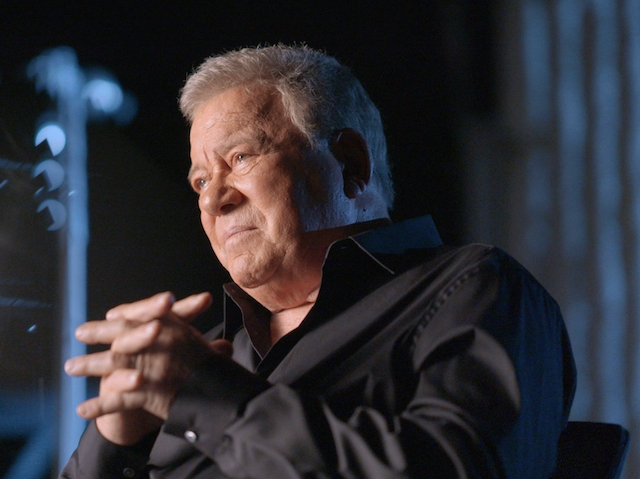
©Courtesy of Legion M
Neil deGrasse Tyson: I would say, yes, that whatever was the nadir in your life you spoke of, that was the word you used in the van, I mean, the flatbed. I agree with you that in fact the soil was tilled for the future. Okay, I’ll be less poetic. You’re doing poetic readings with an orchestra, you’re poetic. Every sentence that comes out of your mouth is…
William Shatner: Poetry [audience laughs]. It’s just that I’ve got a sore arm and I can’t make the — well, I could if I hold it — yes, it was poetry!
Neil deGrasse Tyson: I just don’t want you to undervalue the criticality of those years leading up …
William Shatner: I didn’t think they were marvelous.
Neil deGrasse Tyson: Yes, because I’m old enough to remember when we landed on the moon, there was a certain state of the world at the time where there was still a civil rights movement, campus unrest, a hot war in Southeast Asia, a cold war…
William Shatner: That’s incredible, you’re like the New York Times [laughs].
Neil deGrasse Tyson: There’s a lot of other very important problems in the world that were distracting people. But then there was this glorious adventure that helped plant the seeds to engage [people].
William Shatner: Neil Armstrong had a little bit to do with it…
Neil deGrasse Tyson: And 10,000 scientists and engineers behind that.
William Shatner: So you are making a point…
Neil deGrasse Tyson: Even though “Star Trek” was cancelled in its third season, I value what role it played in the zeitgeist of the nation and the world [audience applauds]. In another comment, you mentioned, “My sister rides horses” and she’s the first to comment that if you’re on a horse in a movie and it’s a different horse. She notices that. You also made note that there were four horses you had.
William Shatner: Well, the horse I rode… That was one of the movies wasn’t it?
Neil deGrasse Tyson: You were two people in that movie…
William Shatner: It was more than one movie…
Neil deGrasse Tyson: How is it that there are so many movies and shows where you play yourself and another version of yourself. That’s got to be a record.
William Shatner: A propos of that, what is the other part of yourself you present to the audience, yourself, which is partially you and partially an act, a mask? So then, you’re asked to play somebody else that’s you, that’s another part of you. Is that another mask or is that part of the original? I mean, how do you play another person?
Neil deGrasse Tyson: Well, you’re an actor. I thought that’s what you get paid to do [audience laughs]. I’m a scientist …
William Shatner: A gentleman by the name of Rob Sharenow and I have been writing lyrics for songs that are now out there [on an album titled xxxxx ] or going to be out there. We wrote a song called “Masks” about how we all carry a different mask with us. For example, Neil, you’re outspoken, you have this volume, this energy and of course, are highly intelligent. When you go home, when you you enter the door — do for us…
Neil deGrasse Tyson: I say, “Honey, where’s the remot? I’ve got to chill out.” It depends on how intense the day was. But if I go into public mode, my whole family shuts it out. They leave the room, they so don’t want any of that.
William Shatner: What is public mode?
Neil deGrasse Tyson: Publicly, I’m an educator and if I sense that somebody doesn’t know something and might want to know it I go to educator …
William Shatner: So you emphasize it for the impact of what you want to know or what you want to get. Well, there’s some that can be some presentational drama in that exercise, yeah. But do you think that other [person] when you come through the door and you say to the class, “Hello, I’m Neil deGrasse Tyson and I’d like to know why water boils.” Can you get the same information without being “Neil” [theatrically]?
Neil deGrasse Tyson: Clearly, the presentation mode is different for a large audience than it would be for one-on-one. Also, it would be different depending on their age. But I’ll use different references that an older person might know, and would never use it for a younger person because they look at me like I’m clueless.
William Shatner: No, but you have a way of speaking publicly and obviously know it. If I had my arm, I would repeat your gestures, which I can’t. But you understand why that is more emphatic than, “Well water boils unbelievably at 212° and let’s find out why.” [Applause].
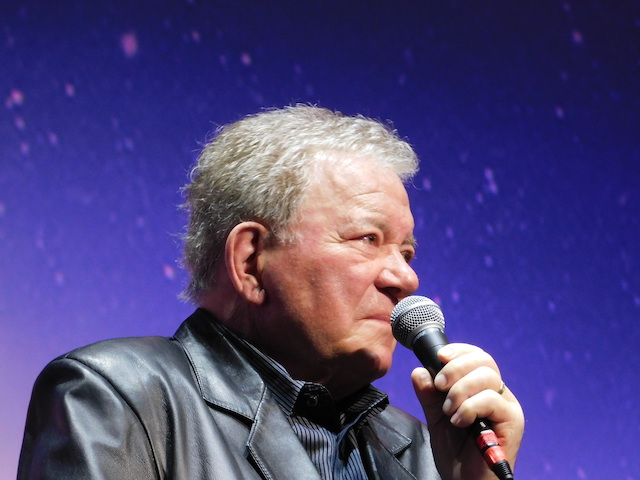
Photo by Nobuhiro Hosoki
Neil deGrasse Tyson: Why, I don’t know that it’s different. I wouldn’t say it’s better; it’s different. That’s when I’ve got to lean in because when you’re about to explain the thermodynamics of heating water and so [the audience] will lean in and try to get that answer. What I’m saying is, depending on who asked it, my answer will be shaped to minimize any resistance between the words out of my mouth and the receptors in their brain.
William Shatner: Why are you anticipating resistance when they’re there to understand why water boils — the thermodynamics of 212°? Is information imparted through a mask or can you be yourself and impart information?
Neil deGrasse Tyson: If I were a professor facing the chalkboard or whatever they’re made of today, and just writing, giving the answer, then you’ve got to meet me where I am — and that’s not being an educator, that’s being a professor. If I’m an educator and you’re on the other side, I’m going to turn around and face you and find out how you best receive and absorb information. I’m going to find the key to as many people as I can and that’s how I’m going to invoke it. But that’s not a mask — that’s just being educated.
William Shatner: By the same token, you can be in love with somebody and say “I love you” and can be the same person who says, “Down with that inhuman being.” Do we act with our masks on, are we a creature of our masks or is there an inner part [that’s] us…?
Neil deGrasse Tyson: I got you, here you go.
William Shatner: An inner side of ourselves …
Neil deGrasse Tyson: You ready? I used to dance in my day…
William Shatner: No kidding? Like what kind of dance?
Neil deGrasse Tyson: [A type] that was a sort of an international Latin ballroom [style] and then some ballet…
William Shatner: Neil, show us what you got! [audience applauds like crazy]
Neil deGrasse Tyson: The operative term being “back in my day.”
William Shatner: But wait a minute, you can’t admit your day is gone —
Neil deGrasse Tyson: Oh yes, I can do that.
William Shatner: Your day is not done. In fact, you’re just arriving at your day!
Neil deGrasse Tyson: Are you still TJ Hooker?
William Shatner: Well, yes I am. [audience goes wild]
Neil deGrasse Tyson: I’m saying something simple.
William Shatner: No, it’s not.
Neil deGrasse Tyson: If I’m in front of or I can stand behind a podium, what does a dancer do — they use their limbs, their body, to help communicate every part of how they can express an idea, a thought, an emotion, to come through. Any good actor knows this — through their face, lips, and body gestures. I’ve danced before, so I use my entire body to communicate. If it’s just words, that feels so mute compared with…
William Shatner: Not to an actor. Words are the basic means of communication and you need to do nothing else but be a guru. Hello… The meaning of life is a fountain, okay? Hang on, that’s part of an old joke where the guy climbs up the mountain to get to the guru and he asks the guru, ‘What’s the meaning of life?” The guru is looking at the fountain and says “My boy, after all the trouble you’ve been through, let me tell you, the meaning of life is a fountain.” And the guy says,”I went through the jungle, up the cliff and down and I hurt myself, broke my leg, to find out the meaning of life and you tell me life is a fountain?” and the guru looks up and says, “You mean life isn’t a fountain?
Neil deGrasse Tyson: Okay, Mr Shatner, but this film is not about you, the actor, it is about how every bit of your life has come together to thread a tapestry of wisdom and insight into life and interactions with each other and your relationship to Earth. So in this film, you went from Captain Kirk to Bill the philosopher.
William Shatner: The question is, can a person be who they are through the various masks?
Neil deGrasse Tyson: You still hung up on masks?
William Shatner: Not to be so literal (mimics lifting off a mask) The masks are. Hello, I’m glad to see you? Do you believe that guy?
Neil deGrasse Tyson: Wait, let me de-literalize this. These chapters of this film are not different masks; they’re aspects of what is genuinely you. If it was a mask, you take it off and it’s sitting over there and it is no longer you. These are elements of you which came together, so that I don’t think of you as Captain Kirk anymore. I think of you as, this man has done some living and has reflected on the meaning of life in ways that we can all benefit. And I want to thank you for that. [massive applause]
William Shatner: Well, I’m certainly not going to fight that. My question is, “Can you ever really get to who you really are? Does anybody?” There’s this phrase you got to get to know yourself. Can anybody really get to know themselves?
Neil deGrasse Tyson: I’d like to add to this. If you remain curious your whole life as you have, it appealed to people to do in this film. Who you are and your perspective on the world continually evolves, so you can’t. My point is exactly, you’re evolving at any moment, so you declare you know yourself — well doesn’t that kind of close shop?
William Shatner: Exactly.
Neil deGrasse Tyson: I mean, so we agree.
William Shatner: No, we don’t.
Neil deGrasse Tyson: Questions from the audience were QR coded in from this huge banner behind me.
William Shatner: I can’t see it…
Neil deGrasse Tyson: You could turn your head around.
William Shatner: No I can’t. That’s what happens when you’re 92 and have arthritis.
Neil deGrasse Tyson: Now you’re complaining that you’re old. Not 10 minutes ago, you said…
William Shatner: I’m older now but before this event, I did fall off a horse more than once. I’ve got a frozen shoulder. My life is a series of interesting coincidences. While the film was playing, I sat around and talked about this with some people and a gentleman who sat beside me was a doctor. I said I’ve got a frozen shoulder and he said well we have made big advances in cold and frozen shoulders. I said, “Can you help me?” He says, “I can.” So I’m sitting beside a guy who might be able to help me get out of this frozen shoulder. Isn’t that interesting? [Looking towards Tyson…] One of the most valuable coincidences of my life is meeting you.
Neil deGrasse Tyson: Well, thank you.
William Shatner: Come on, that was set to warm you up.
Neil deGrasse Tyson: If you couldn’t have been an actor, what do you think you would have been in life? Might you have played football? Was that a football photo or some other athletic [activity]?
William Shatner: I wasn’t big enough to play football — neither fast enough or strong enough or had the brains. Otherwise, I would have been a great, I don’t know, teacher…
Neil deGrasse Tyson: Would you have been a comedian?
William Shatner: I would love to do documentaries, and have done film documentaries. They’re the exploration of the truth.
Neil deGrasse Tyson: What was the name of your show, “The Truth is Out There” or something like that?
William Shatner: “I Don’t Understand…”
Neil deGrasse Tyson: “The Unexplained”…?
William Shatner: I had a talk show called “I Don’t Understand with William Shatner” about everything that I don’t understand — which is everything…
Neil deGrasse Tyson: That was the show I was on. You came to ask me stuff that you didn’t understand. That was fun, and I forgot but I did it with full body gestures.
William Shatner: I could have been a documentary maker.
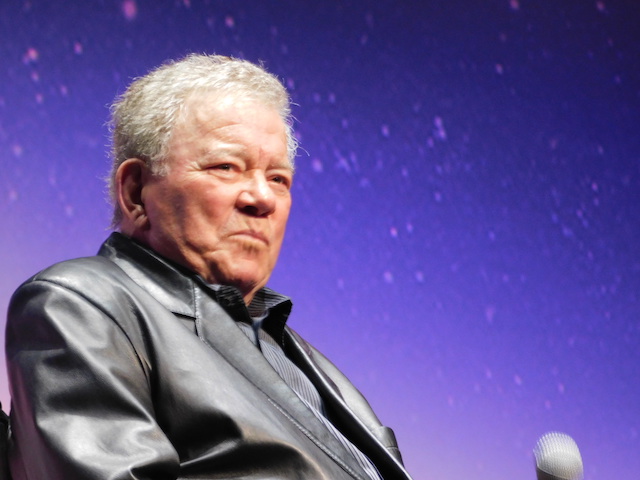
Photo by Nobuhiro Hosoki
Neil deGrasse Tyson: You’re a great accumulator of wisdom which this film clearly demonstrates. An audience member asked, “What did you wish you might have known earlier in life rather than later?”
William Shatner: What I’ve learned is that everybody who gets older learns [that] it’s over so quickly. What happened? I just got out of the womb and, okay, I like that girl, okay, I’ve got children, and now, I’m going to die. The four stages of life there.
Neil deGrasse Tyson: Someone asked for a cheap one. Can you say “Denny Crane” the way you would on “Boston Legal?”
William Shatner: People come up to me and ask me to say “Denny Crane” all the time. No, I’m not going to say Denny Crane. But for this audience I will. I’ll explain what I was doing. David E Kelly, the producer/writer of “Boston Legal” wrote just about every script, he’s a genius. So one day I’m reading the script and he has the character say Denny Crane four or five times: “Denny Crane, Denny Crane, Denny Crane, Denny Crane, Denny Crane.” What do you do with that? How do I act that, what he was. Then I had a recollection of a lizard…
Neil deGrasse Tyson: Yes, you described that in the film. So that’s brilliant — how a lizard sticks its tongue out and senses what’s out there [Shatner mimics lizard sticking tongue out].
William Shatner: So if I say “Denny Crane Denny Crane Denny Crane…”
Neil deGrasse Tyson: You’re taking the temperature of the room.
William Shatner: I’m taking a reading of the room when I say my name, “Denny Crane Denny Crane.” Okay so that’s good, that’s good…
Neil deGrasse Tyson: Maybe the serpent in the tree in the Bible was just trying to check on what the Garden of Eden was about.
William Shatner: No, he had an apple in his mouth…
Neil deGrasse Tyson: What kind of role might you have done but the opportunity never came your way?
William Shatner: I would love to have worked with some of the auteur directors when I was younger, pitted myself by doing the great roles which I did at one time [in a play] in one form or another but was never [recognized for].
Neil deGrasse Tyson: You mean Shakespeare?
William Shatner: Well yes, the Shakespearean classics, but I never did. I played classics — but never the leading role — under a guy whose mentality I respected.
Neil deGrasse Tyson: I will declare that in 500 years, “Star Trek” will be remembered and the rest of those stories will have been forgotten. Then retrospectively, you would have fulfilled your dream of playing the lead in a classic.
William Shatner: I appreciate that.
Neil deGrasse Tyson: No one ever identifies the classic in the moment; it’s just something else that people are doing. When it survives the test of time the stock in its Classics value goes up. For example, Roger Corman’s film, “The Intruder,” is a classic, a criminally under-seen film. It’s one of your finest performances — it’s absolutely brilliant.
William Shatner: The psychology behind that film — which is from a novel — was of a young guy in New York who decides to go down South and be a rabble rouser and gets this town to riot. It was made when the schools were being integrated and this total stranger who had no connection with, for, or against integration caused riots down south during that turmoil period. What in Heaven’s name was he thinking, what was his psychology? I tried to understand that.
Neil deGrasse Tyson: By the way, to Southerners, if you’re from the North you’re a Yankee; if you’re from the Northeast, you’re a damn Yankee; and if you’re from New York City, you’re goddamn Yankee. This assumes you have this hope and it’s what gives you hope for the next generation.
William Shatner: That’s such a good thought. Me and [Ben Folds] wrote songs for a particular album about the world and its turmoil, to put it mildly. One of the major songs that we’re making into a music video is called, “So Fragile, So Blue.” It’s about how vulnerable our Earth is. It’s what I came back with after I was up in space looking out the window into darkness and I saw [Earth]. I’ve been fascinated by space and all its awe and mystery, and I didn’t see it in that blackness I saw from the spaceship when I looked down on Earth. I saw life beige, blue, white, everything on this little rock with this two miles of skin of usable air…
Neil deGrasse Tyson: Our atmosphere is to Earth what the skin of an apple is to an apple.
William Shatner: An onion skin is so narrow, everything is the amount of dirt, usable soil, on this rocky thing we’re on, the same way it’s an onion skin and I saw how vulnerable and how extinction is happening to things. Neil, we’re watching things go extinct that we didn’t know existed. Yeah, so how sad is that…
Neil deGrasse Tyson: The question is, what hope do you have? If I read you right, what hope does the next generation hold for you?
William Shatner: I wouldn’t laugh at that because I saw how vulnerable we were. I came back filled with grief for the Earth. I’ve been asked would I go up again, and I said no because it was like trying to have another love affair or whatever. But now I realize, if I go up there again, what I will do is come back armed with the knowledge of how hard so many of us are trying to make things right. Scientists are gathering at huge universities trying to get the carbon dioxide, methane, pollutants and plastics out of the earth and the ocean. How hard are we now trying to make amends. I would come back with a load of hope.
Neil deGrasse Tyson: Sounds like you wants to go back into space again [applause].
William Shatner: Do you want to scratch my back? [chuckles]
Neil deGrasse Tyson: I think what we learn this evening is that if you lead a life that’s eternally curious — no more curious than a child is when you think about it — we’re just talking about childhood curiosity carried into adulthood. That leads to a life of learning. With every new thing learned, there’s another possible way you can connect ideas, thoughts and understandings.
William Shatner: I agree, and that’s why I love talking with you. You’re so filled, not only with curiosity, but you’ve got so much of the information, so many of the answers.
Neil deGrasse Tyson: Thank you but I’m saying it’s hard to grow your wisdom if you stopped learning about the world. This was evident especially going into space at age 90 or whatever it was. One other point I want to make about you [is that] after a while you became your own best caricature so no one could imitate you better than you. You own your identity in this world — not many people get to say that.
William Shatner: That’s interesting to think about. That I am who I am — I’m thinking about [this too much].
Neil deGrasse Tyson: People imitate you with your sort of pause acting phrasings and no one does that better than you. I don’t need to hear them.
William Shatner: I think you’re doing me in exaggeration…
Neil deGrasse Tyson: I want to give you the final word. I’ll lead up to it with my final word here. Of all the captains, you are my favorite and I’m not just saying that. I love Picard and Captain Janeway but what I liked about you — because again, I was young at the time — I’d said you got into fights with the aliens and if I’m supposed to serve you as Captain and you’re fighting the aliens, I’m going to fight the aliens too.
But if you went into the back and told us to go out and fight the aliens, I said, “What kind of Captain is that?” You were there when it mattered; you were seat of the pants, make a decision, forget the logic of Spock [kind of guy.] Almost everyone here knows that Captain Kirk always beat Spock at chess because Spock could only make rational decisions and Kirk had the capacity to be irrational on a level that defeats logic. These were the properties that if I’m a Captain, that’s the kind of Captain I wanted to be.
William Shatner: I would also like to thank you for your brilliance, that brain of yours which is throbbing to expose itself at every opportunity [audience goes crazy]. You are remarkable.
Neil deGrasse Tyson: It’s never quite been put that way before.
William Shatner: I hope you’ll remember it. You’re a remarkable man and I’m so glad to to know you and I look forward to getting to know you better in the future. And I want to thank all of you for being here to see this film.
if you liked the article, share your thoughts below!
Check out more of Nobuhiro’s articles.
Here’s the trailer of the film.

